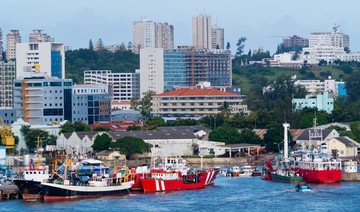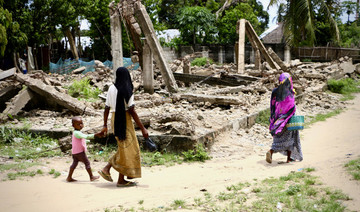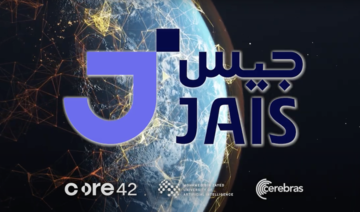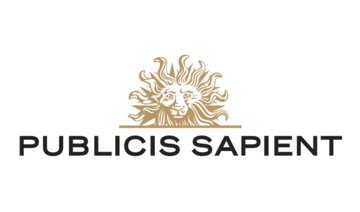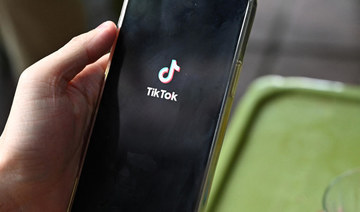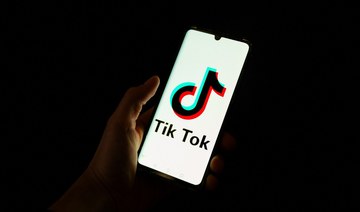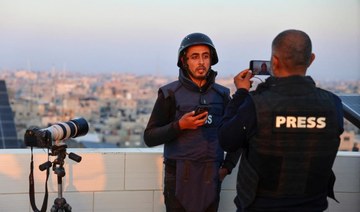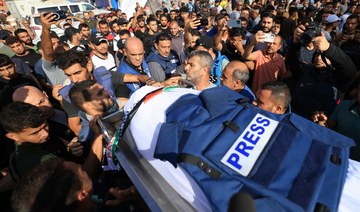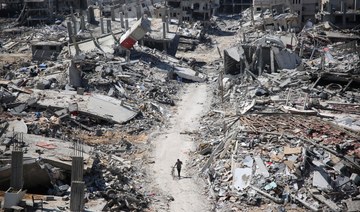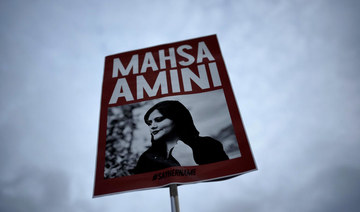MAPUTO: Fears are growing that a Mozambican journalist detained for two months in the country’s volatile north is in a “critical condition,” rights group Amnesty said on Tuesday.
Amade Abubacar, who works for the state-owned Comunitaria Nacedje de Macomia radio and television in northern Cabo Delgado province, has been detained since January 5 on charges of espionage.
Abubacar was seized by police at a bus stop while conducting interviews and taking photographs of people fleeing militant attacks.
Amnesty said in a statement it had received “credible reports” that he had been mistreated and denied medical attention.
“(They) must be investigated thoroughly and transparently and all those suspected of criminal responsibility brought to book,” said Deprose Muchena, Amnesty International’s southern Africa regional director.
“Amade is languishing in jail for simply doing his job as a journalist, exposing the suffering wrought on civilians by deadly attacks in Cabo Delgado.”
Since October 2017, Islamist fighters have terrorized remote communities in the gas-rich, Muslim-majority Cabo Delgado region, killing around 200 people and forcing thousands from their homes.
Rights groups have accused security forces waging the fight against the militants of serious abuses, including summary executions and arbitrary detention.
On 25 January representatives of the Mozambican Bar Association visited Amade, along with his lawyer, during which time he told them “he had been subjected to different forms of ill-treatment by the military.”
“He has also complained of being denied food,” Amnesty added.
Amnesty raises alarm for detained Mozambique journalist
Amnesty raises alarm for detained Mozambique journalist
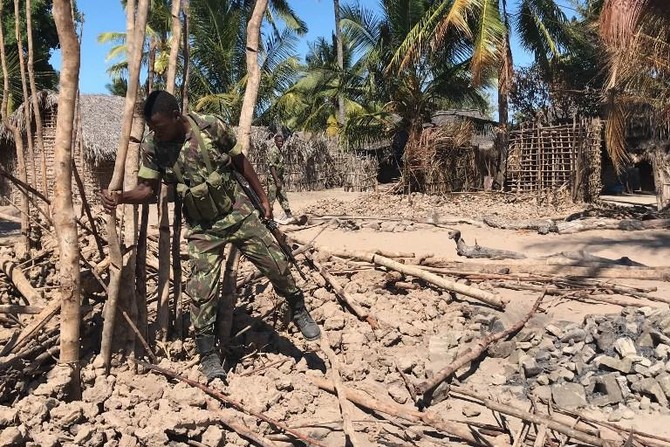
- Amade Abubacar was seized by police at a bus stop while conducting interviews and taking photographs of people fleeing militant attacks
- Abubacar has been detained since January 5 on charges of espionage
‘Vision 2030 has set a blueprint for the future of the Kingdom,’ says TBWA\RAAD’s Saudi MD
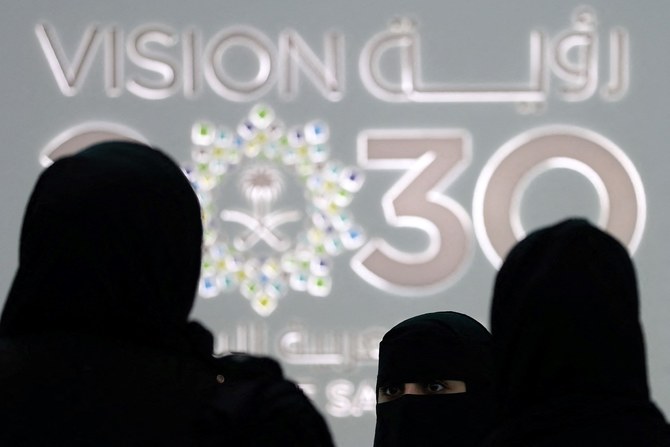
- Ad agency’s new Riyadh office to serve as a central hub for local, regional, global brands looking to succeed in Saudi Arabia
DUBAI: Advertising agency TBWA\RAAD appointed Dan Leach as its managing director for operations in Saudi Arabia following the establishment of a new office in Riyadh earlier this year. It is now bidding to cement its presence in the Kingdom.
The agency has been working with clients such as KFC, NEOM, and Nissan in the Kingdom for 20 years and now, with its new office, it aims to strengthen and serve as “a central hub for local, regional, and global brands looking to make their mark in the country,” Leach said.
He told Arab News: “The Middle East is renowned for its leadership and bold ambition, and Saudi Arabia exemplifies these qualities. But what I believe makes the Kingdom stand out further is its single-minded approach to disrupting the status quo … of everything.
“From building the largest vertical city in the world in NEOM; redefining luxury in the Red Sea; bringing the world’s sporting events to the country and more, there is no blueprint for what Saudi Arabia is doing.”
 Staffing the new office is a “critical aspect of our expansion strategy” and the company is currently focusing on making “strategic hires,” including a new local senior management team, with the objective of ensuring “we have the right talent in place to meet the dynamic needs of our clients, driving our success not only in Riyadh, but across Saudi as a whole,” Leach said.
Staffing the new office is a “critical aspect of our expansion strategy” and the company is currently focusing on making “strategic hires,” including a new local senior management team, with the objective of ensuring “we have the right talent in place to meet the dynamic needs of our clients, driving our success not only in Riyadh, but across Saudi as a whole,” Leach said.
Saudi’s Vision 2030 has accelerated the growth of multiple industries, as well as technology and innovation, presenting new opportunities for advertising agencies like TBWA\RAAD.
Leach added: “Saudi’s story now belongs on the world stage, which implies that storytelling must be characterized by award-winning strategic and creative thinking.”
The country’s ambition to be at the forefront of technology such as artificial intelligence aligns with the agency’s vision.
Leach said: “We need to keep pace with the ambition of the Kingdom in this area and ensure our clients are benefiting from transformative innovation that can reach new customers.”
This ambition is evident in the growth of the creative and media industry, which is already seeing an “influx of bold award-winning campaigns fueling the emergence of incredible, young creative talent that will see the sector thrive for years to come,” he added.
Contrary to the common belief that Saudi lacks creative talent, Leach’s experience has been quite the opposite.
He said: “I have had a number of discussions with young creatives, and there is a genuine passion and hunger from this next generation to be at the forefront of the industry.”
He believes it is important for the industry to foster this talent in order to bolster the growth of the industry. The agency is therefore working with local universities to implement a graduate and internship program to help identify and support creative talent in the Kingdom.
Saudi Arabia’s growth and vision have attracted global attention and investment, with brands stepping up their game in the Kingdom. Leach, however, cautions brands against entering the market with a copy-and-paste approach.
He said: “We’re seeing a lot of brands come into the Kingdom with the approach of simply localizing copy and thinking that is enough to win; it’s not.”
He explained that Saudi consumers are savvy and can distinguish between brands that are being opportunistic and those truly embracing local culture.
Brands can also find success in aligning their story with that of the Kingdom and its leadership, Leach said.
He added: “Brands are entering a country that has near unlimited ambition — they need to match that energy.”
They do so by embracing new technology and aiming big, he said, and this also means brands should experiment and do things differently.
He said: “The Kingdom is an incredibly exciting place where there is room and opportunity to challenge the status quo.”
TBWA\RAAD, for example, has made significant advances in adopting AI — such as partnering with Core42 last year to harness the potential of Arabic large-language model Jais in the creative sector and launching its own ChatGPT-based tool Co-Pirate — to support clients.
The agency is also working on bringing new products to the Kingdom, including dedicated social media programs, retail initiatives and internal communications platforms.
Leach said: “Our ambition is not to be the largest agency in the Kingdom but creatively the most exciting, and Saudi Arabia presents the perfect canvas upon which we can deliver that ambition.”
TikTok to label AI-generated images, video from OpenAI and elsewhere
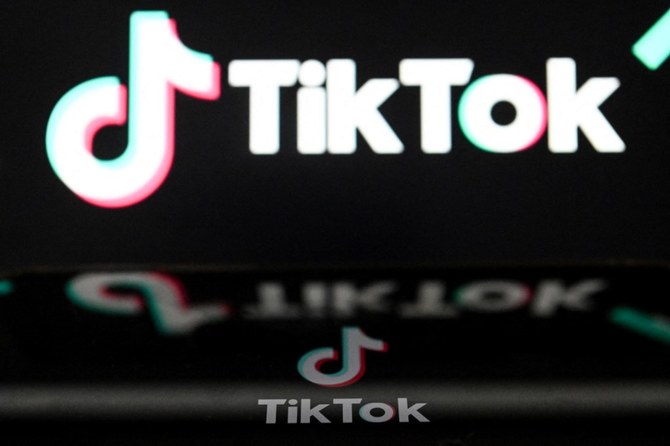
- Content Credentials technology denotes how images were created and edited
- For the system to work, both AI maker and platform must adhere to use the industry standard
LONDON: TikTok said on Thursday it would start using a technology aimed at helping it label images and video generated by artificial intelligence and uploaded to the video sharing service.
TikTok said it would adopt “Content Credentials,” a digital watermark that denotes how images were created and edited. The Content Credential technology was spearheaded by Adobe but is open for other companies to use and already has been adopted by companies such as ChatGPT creator OpenAI.
Researchers have expressed concerned that AI-generated content could be used as misinformation in an attempt to interfere with US elections this fall. TikTok was already among a group of 20 tech companies that earlier this year signed an accord pledging to fight it.
YouTube, owned by Alphabet’s Google, as well as Meta Platforms, which owns Instagram and Facebook, have also said they plan to use Content Credentials.
For the system to work, both the maker of the generative AI tool used to make content and the platform used to distribute the contents must both agree to use the industry standard.
If a person uses OpenAI’s Dall-E tool to generate an image, for example, OpenAI attaches a watermark to the resulting image. If that marked image is then uploaded to TikTok, it will be automatically labeled as AI-generated.
TikTok, which is owned by China’s ByteDance, has 170 million users in the United States, which recently passed a law requiring ByteDance to divest TikTok or face a ban. TikTok and ByteDance have sued to block the law, arguing it violates the First Amendment.
TikTok already labels AI-generated content made with tools inside the app but the latest move would apply a label to content generated outside of the service.
“We also have policies that prohibit realistic AI that is not labeled, so if realistic AI (generated contents) appears on the platform, then we will remove it as violating our community guidelines,” Adam Presser, head of operations and trust and safety at TikTok, said in an interview.
Arab League affirms its solidarity with Palestinian journalists
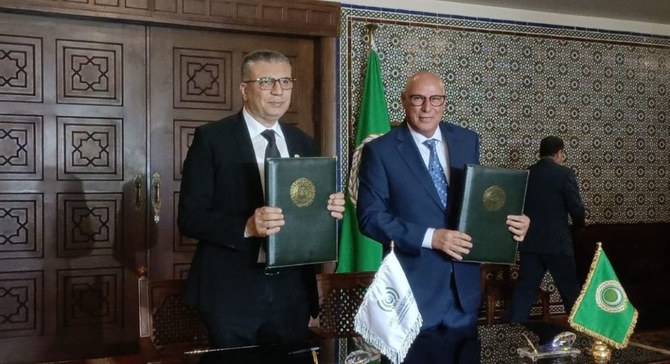
- Ahmed Rashid Khattabi urges global organizations to support freedom of the press
- Khattabi criticized the Israeli authorities for closing down Al Jazeera in Israel and confiscating its equipment
CAIRO: The League of Arab States has expressed solidarity with Palestinian journalists in Gaza, the West Bank, and East Jerusalem, and called for their protection.
May 11 has been designated a day of global solidarity with the Palestinian media as it marks two years since the Israeli occupation forces’ assassination of journalist Shireen Abu Akleh while she was carrying out her duties with the Al Jazeera Media Network.
Ambassador Ahmed Rashid Khattabi, the league’s assistant secretary-general and supervisor of the Media and Communication Sector, said the move “symbolizes a powerful demonstration of solidarity with the Palestinian media community.”
This support is particularly significant given the plight of the Palestinians and the continued Israeli aggression in the Gaza Strip.
The aggression has resulted in the deaths of more than 34,000 people, including 142 journalists, since October.
This figure exceeds the number of journalists who lost their lives in areas of armed conflict worldwide in 2023, a total of 99, according to the US Committee to Protect Journalists.
Khattabi urged global organizations to support the freedom of the press and protect Palestinian journalists covering the conflict.
Khattabi said it was imperative to ensure journalists’ safety under the principles of international humanitarian law, given the grave conditions in which they work.
He criticized the Israeli authorities for closing down Al Jazeera in Israel and confiscating its equipment, viewing these actions as illegal measures against the Palestinian media and other media institutions, and constituting a blatant violation of international conventions.
He added that it was unacceptable to violate fundamental rights as enshrined in the Universal Declaration of Human Rights and other international declarations promoting freedom of opinion and access to information.
These violations acted against the UN Plan of Action on the Safety of Journalists and the International Federation of Journalists’ declaration, he said.
BBC investigation finds half of water facilities in Gaza have collapsed
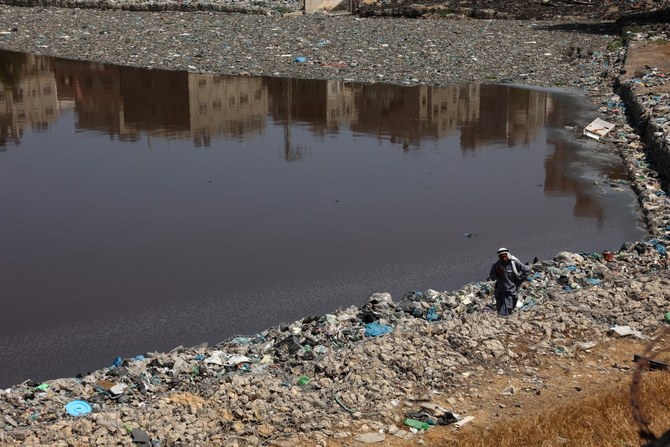
- Over half of desalination plants and borehole systems have been damaged or destroyed
- Damage to wastewater treatment plants has caused a surge of waterborne illnesses
LONDON: A BBC investigation has revealed that half of Gaza’s water and sanitation facilities have collapsed since the start of the Israel-Hamas war.
Satellite footage from BBC Verify showed just over half of the 603 desalination plants and borehole systems used to supply water to Gaza have been damaged or destroyed, along with four of the six wastewater treatment plants.
According to an aid agency cited by the BBC, the remaining two treatment plants have shut down due to lack of fuel or supplies. Repair efforts have been severely disrupted by damage to a major depot.
The collapse of facilities has led to a surge in waterborne illnesses, posing serious health risks to the population and particularly to children and pregnant women.
The number of cases of diarrheal disease, hepatitis A, and in some cases, cholera, have all spiked dramatically.

Dr. Natalie Roberts, executive director of Medecins Sans Frontieres UK, said the destruction of water and sanitation facilities had resulted in “disastrous health consequences for the population,” leading to fatalities.
She highlighted Rafah and the southern border region as particularly affected areas.
The BBC said as the exact condition of each facility could not be determined, there was no distinction between classifying them as “destroyed” or “damaged”.
It also acknowledged that not all damage was visible from the satellite images — mostly in northern Gaza or the area around the southern city of Khan Younis — so some affected facilities could have been missed.
The situation has been exacerbated by damage to Gaza’s Coastal Municipalities Water Utility and the main service depot of UNICEF, making repairs challenging.

Human rights experts argue facilities critical to civilian survival should be protected.
Leila Sadat, a former special advisor on crimes against humanity at the International Criminal Court, suggested the pattern of destruction indicated either a “reckless approach” to civilian infrastructure or intentional targeting.
She added it was possible that “these were not all mistakes.”
In response to BBC’s findings, the Israel Defense Forces said Hamas used civilian infrastructure for military purposes, storing weapons and ammunition.
It maintains water facilities were primarily struck during airstrikes targeting Hamas fighters and denies intentionally targeting civilian infrastructure.
Turkiye’s competition board to fine Meta $37.2 million in data-sharing probe
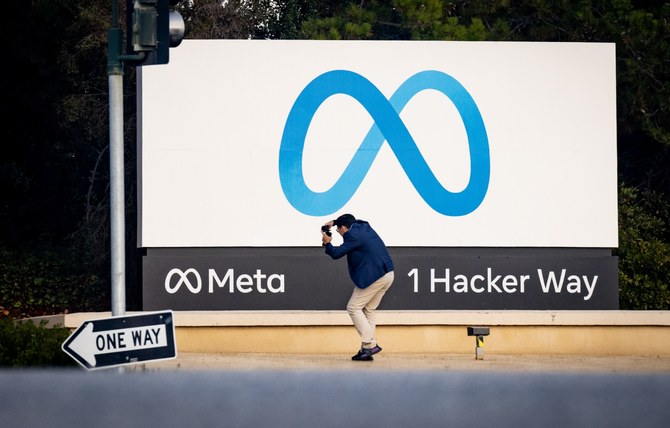
- The board launched an investigation into Meta in December over a possible violation of competition law
- Last month Meta said it would temporary shut down Threads to comply with interim measure
ISTANBUL: Turkey’s competition board fined Meta Platforms 1.2 billion lira ($37.20 million) on Wednesday after concluding two separate investigations on data-sharing in its Facebook, Instagram, WhatsApp and Threads platforms.
The board launched an investigation into Meta in December over a possible violation of competition law by linking its social media platforms Threads and Instagram. The board in March imposed an interim measure on Meta meant to hinder data sharing between those two platforms.
Meta said last month it would temporarily shut down Threads in Turkey to comply with the interim order.
The board said on Wednesday it imposed a fine of 898 million lira for the compliance process and the investigations launched into Facebook, Instagram and WhatsApp, as well as an additional 336 million lira fine for a separate investigation into Threads.
Users will be able to merge personal data between Facebook, Instagram, and WhatsApp with their own consent and will be notified about data usage, according to the board decision. Users will be able to change their settings later, if needed, using an “accounts centre” on the platforms, it said.
In January, the board also fined Meta $160,000 per day for failing to provide sufficient documentation as part of another previous investigation. It had also imposed a daily fine of 4.8 million lira per day in March over a notification message about data-sharing.
Both those penalties ended May 3.
In 2022, the board also decided to fine Meta 346.72 million lira for violating competition law.


